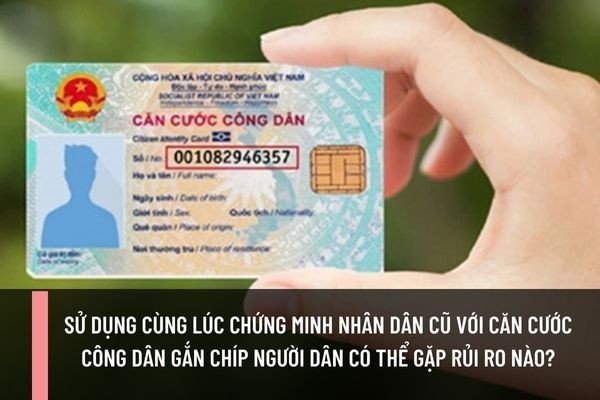Concurrent Use of Old Identity Cards and Chip-Based Citizen Identification Cards: Potential Risks for Citizens
What risks may citizens face when simultaneously using the old identity card with the new chip-based citizen ID card?
According to Clause 8, Article 5 of Circular 60/2021/TT-BCA on procedures for issuing, renewing, and reissuing the citizen ID card (CID), the old identity card (ID) and the old CID will be revoked when citizens conduct procedures to switch from ID to chip-based CID, or renew the chip-based CID. The old IDs and CIDs will no longer be valid from the date you receive the new chip-based CID.
However, in some cases where citizens report the card lost (which may be found later), do not submit the card, or the officials handling the procedures forget to take it back (or cut the corner), they may still keep and use the old ID and CID in parallel with the new chip-based CID. Although the law does not prohibit the simultaneous use of the old ID and CID, this may contain certain risks, specifically:
Monetary Penalty
You may face a warning or a fine ranging from VND 300,000 to VND 500,000 for failing to comply with the regulations on issuing, renewing, and reissuing the CID, according to point b, Clause 1, Article 10 of Decree 144/2021/ND-CP.
If you intentionally do not submit the old ID or CID and continue to use it as an identification document after being issued the chip-based CID, you will be subject to violation handling. Depending on the severity, you may face a warning or a monetary penalty as mentioned above.
Prone to Document Forgery
When performing administrative procedures, civil transactions, etc., presentation of the chip-based CID is sufficient. Organizations and agencies can use devices to read the QR code on the card to acquire your personal information without needing any additional documents. But for the old ID or CID without a chip, citizens must photocopy and notarize these documents to be legally valid in certain transactions.
Thus, if these documents fall into the wrong hands, or if someone merely possesses the information on the old ID or CID, it can easily be forged for purposes such as fraud, borrowing money, etc.
Difficulty in Updating and Standardizing Personal Information in the Future
The personal information and documents such as health insurance, social security, driver's license, etc., have been integrated into the chip-based CID and updated in the National Population Database. Therefore, if you use the old ID or CID to declare, register for public administrative procedures, there may be non-matching information (since the information on the old ID and CID may differ), causing difficulties in updating information later.

What risks may citizens face when simultaneously using the old identity card with the new chip-based citizen ID card? (Image from Internet)
At what age must the citizen ID card be renewed?
According to Article 21 of the Law on Citizen Identification 2014, the regulation is as follows:
Age for renewing the Citizen ID card
1. The Citizen ID card must be renewed when citizens reach the ages of 25, 40, and 60.
2. In cases where the citizen ID card is issued, renewed, or reissued within a period of 2 years before the ages specified in Clause 1 of this Article, it shall be valid until the next renewal age.
Thus, when citizens reach the ages of 25, 40, and 60, they must proceed to renew their citizen ID cards.
However, if the citizen ID card is issued within 2 years before these ages, it will remain valid until the next required renewal age.
How is the validity of the citizen ID card stipulated?
According to Article 20 of the Law on Citizen Identification 2014 regarding the validity of the citizen ID card, it is stipulated as follows:
- The Citizen ID card is a personal identification document of Vietnamese citizens, certifying the identity of the cardholder for transactions within the territory of Vietnam.
- The Citizen ID card can be used in place of a passport in cases where Vietnam and other countries have signed treaties or international agreements allowing citizens of the signatory countries to use the citizen ID card instead of a passport within each other's territory.
- Authorized agencies, organizations, or individuals can request citizens to present their Citizen ID card to verify identity and other information; they can use the personal identification number on the Citizen ID card to check the cardholder's information in the National Population Database and specialized databases as per legal regulations.
When citizens present their Citizen ID cards as requested by authorized agencies, organizations, or individuals, those authorities cannot require citizens to present additional documents certifying the information specified in Clauses 1 and 3 of Article 20 of the Law on Citizen Identification 2014.
- The State protects the lawful rights and interests of those issued with the Citizen ID card according to legal regulations.
LawNet